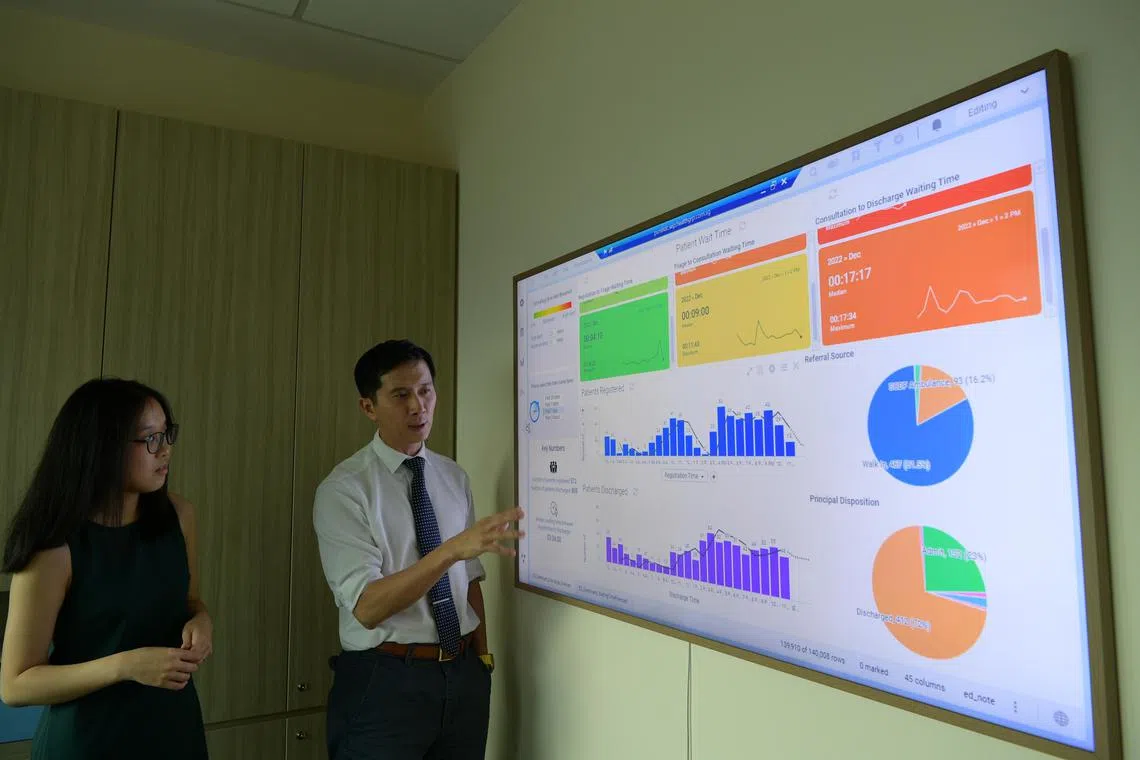AI platform helps NUHS ease hospital bed crunch by predicting availability up to 2 weeks in advance
Sign up now: Get ST's newsletters delivered to your inbox

NUHS group chief technology officer Ngiam Kee Yuan and data scientist Charmayne Low viewing a live dashboard from the AI platform.
ST PHOTO: NG SOR LUAN
SINGAPORE - As part of efforts to ease the hospital bed crunch situation, the National University Hospital System (NUHS) has developed an artificial intelligence (AI) platform that can predict the availability of beds as much as two weeks in advance.
Endeavour AI, which has been in place since March, integrates live data from the healthcare cluster’s electronic medical patient records system.
By scanning a patient’s history and doctors’ notes, the AI can predict the estimated length of stay of each patient admitted to NUHS’ public hospitals.
A patient who is estimated to stay in the hospital for more than two weeks will be flagged to the medical team, who can then, for instance, plan to transfer the patient earlier to a community hospital for rehabilitation.
“With the predictions taken together, the system is able to predict hospital bed states as far as two weeks ahead of time to optimise bed capacity and patient placement,” NUHS said.
The Straits Times has reported that both public and private hospitals are experiencing a shortage of beds,
The AI can also predict a patient’s risk of deteriorating health by reading doctors’ notes on him, vital signs and other test results.
The algorithm – whose accuracy has been validated using the past six months of data from the electronic medical patient records system – runs up to 30 times an hour to calculate the estimated length of stay for all patient admissions.
NUHS said the next step is to develop the AI’s ability to recommend care plans for the patient.
Endeavour AI also features a live dashboard that processes and displays key medical information of all patients across NUHS hospitals and clinics.
The system alerts staff to increased wait times in emergency departments, enabling additional manpower to be quickly deployed if needed.
Together with the ability to predict when emergency departments will be crowded, waiting times can be shortened by between 30 minutes and several hours, depending on the deployment of staff.
This is useful during the departments’ morning and evening peak periods, NUHS said.
Endeavour AI visually displays the bed situation across NUHS institutions, allowing bed management units to see at a glance the number of patients across five of the healthcare cluster’s institutions – Jurong Medical Centre, Jurong Community Hospital, Ng Teng Fong General Hospital, National University Hospital and Alexandra Hospital.
Speaking at the Singapore Healthcare AI Datathon and Expo on Friday, NUHS group chief technology officer Ngiam Kee Yuan described Endeavour AI as a key project that can transform patient experience and improve operational efficiency.
The AI allows clinical practitioners to make faster, more accurate diagnoses and precise treatments, he said.
“Healthcare institutions today aggregate vast quantities of data, but most of this data is analysed retrospectively,” said Associate Professor Ngiam.
Endeavour AI provides AI models in real time, producing insights that can result in better patient outcomes, he added.
Meanwhile, NUHS plans to evaluate and deploy an internally developed AI imaging model, which can assist doctors in scoliosis assessments.
The model can automatically measure the degree of scoliosis – a sideways curvature of the spine – with early trials suggesting that it can cut reporting time with a “modest increase in accuracy”.
This will enable earlier referral and treatment by a scoliosis specialist, NUHS said, adding that it hopes to implement the model as part of scoliosis screening under the mandatory national school health screening programme.


